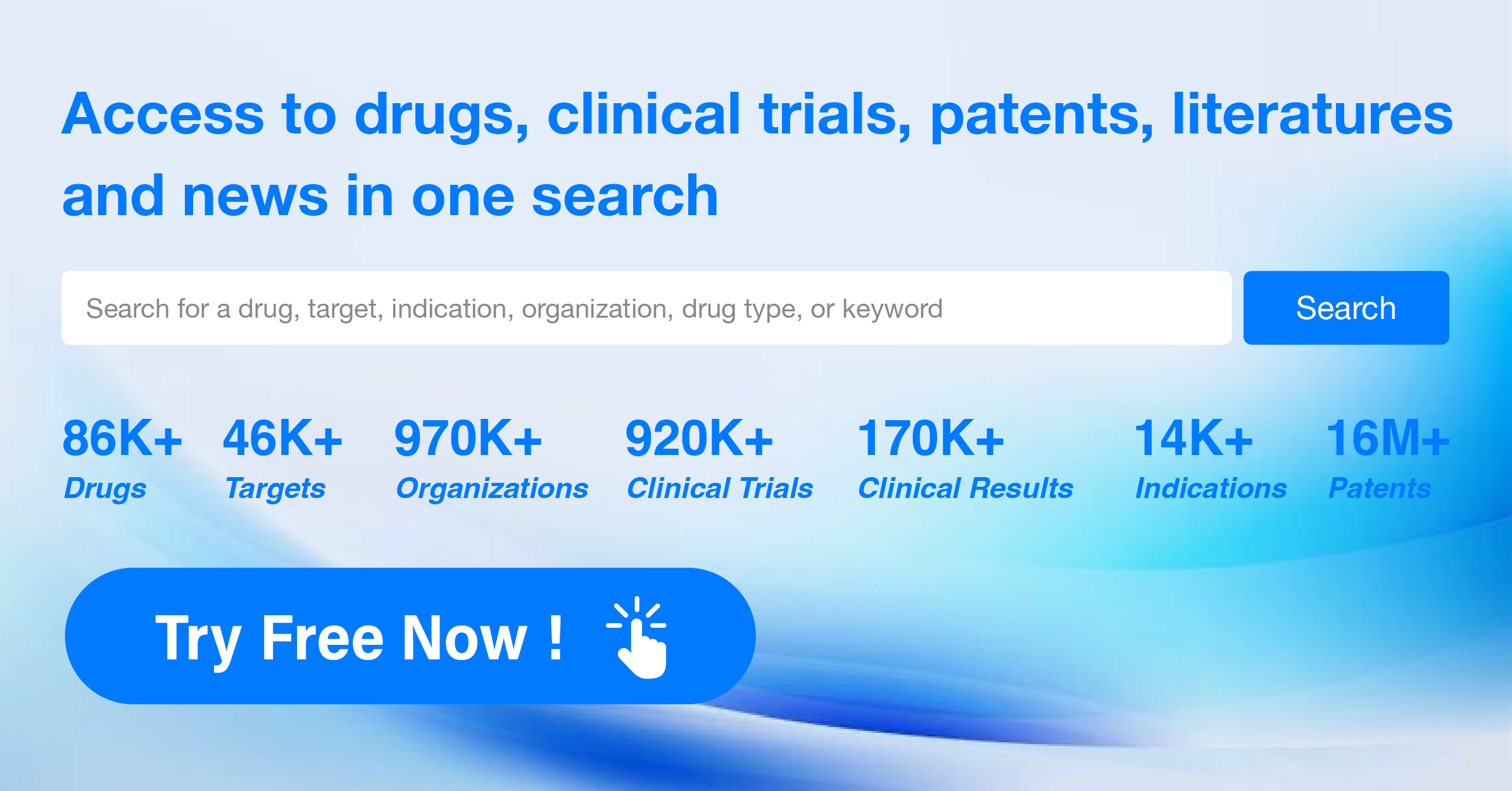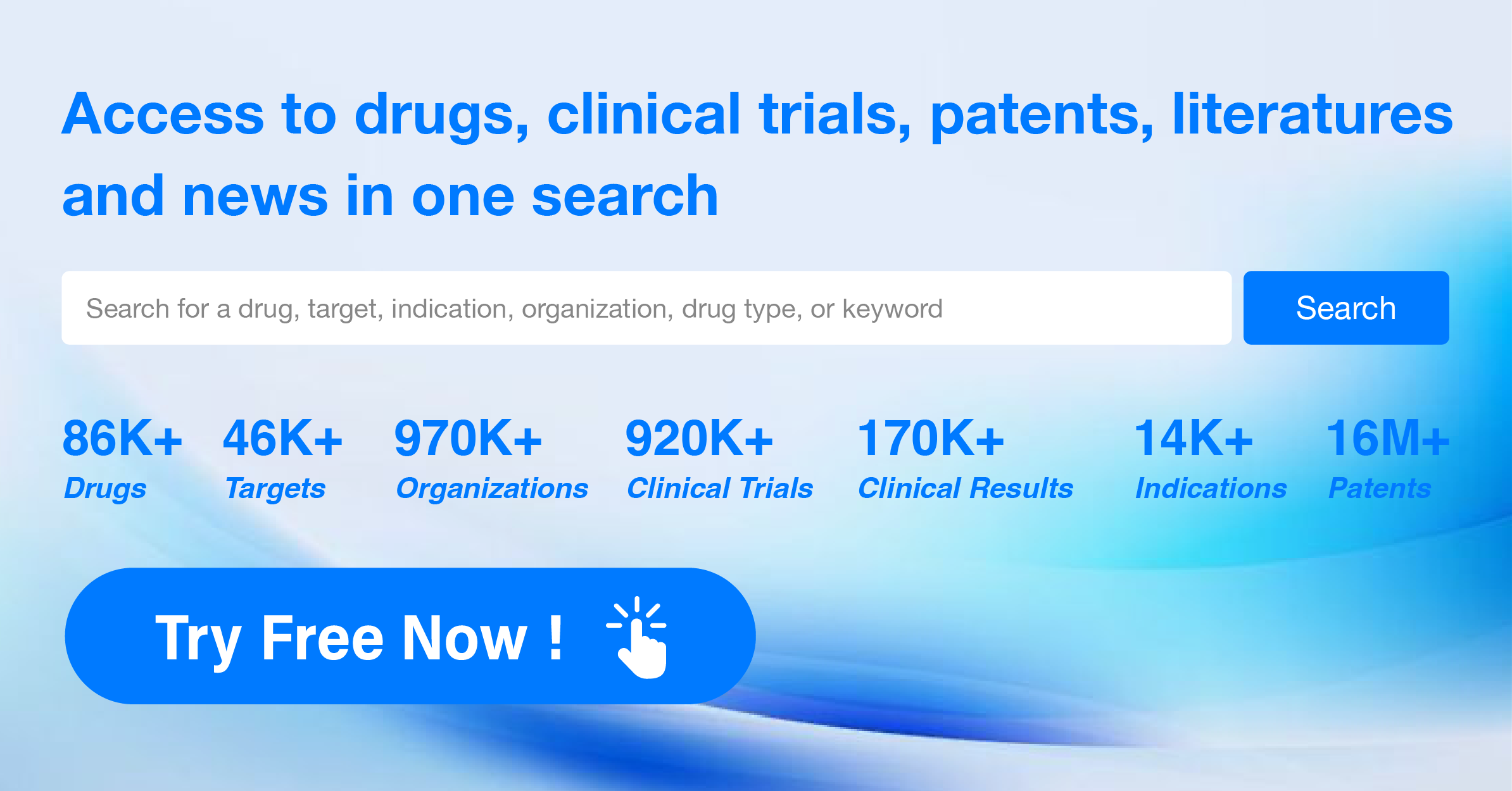Global New Drug Research and Development Progress Weekly Report(5.13-5.19)
Global Pharmaceutical Research and Development Progress
1.Dupilumab Files New Indication Application in the U.S. for Treating Adolescents with Chronic Rhinosinusitis with Nasal Polyps
On May 13, Regeneron and Sanofi announced that the supplemental Biologics License Application (sBLA) for Dupilumab (brand name: Dupixent) to treat adolescent patients with chronic rhinosinusitis with nasal polyps (CRSwNP) has been granted Priority Review by the FDA, with a PDUFA date set for September 15, 2024. If approved, Dupilumab would become the first therapy in the United States specifically for CRSwNP in adolescents aged 12-17 years. This sBLA is primarily based on the positive treatment effects of Dupilumab observed in two Phase III studies (SINUS-24 and SINUS-52) in adult patients. In the SINUS-24 study, patients in the Dupilumab group showed significant improvement in nasal congestion/obstruction symptoms compared to placebo (score difference of 0.89, p<0.0001) and a significant reduction in NPS scores (score difference of 2.06, p<0.0001). Similarly, in the SINUS-52 study, patients receiving Dupilumab experienced significant improvement in nasal congestion/obstruction symptoms compared to placebo (score difference of 0.87, p<0.0001) and a significant reduction in NPS scores (score difference of 1.80, p<0.0001). Furthermore, Dupilumab also reduced the need for systemic corticosteroids or surgery in adult CRSwNP patients.
2.Sanofi Initiates Phase III Clinical Trial of Anti-CD40L Monoclonal Antibody SAR441344 in China
On May 13, the Drug Clinical Trial Registry and Information Disclosure Platform indicated that Sanofi's anti-CD40L monoclonal antibody SAR441344 (frexalimab) has initiated a Phase III clinical trial in China. The product first entered Phase III in December 2023. This study is a randomized, double-blind, placebo-controlled clinical trial, aiming to recruit 20 participants domestically. It seeks to evaluate the safety and efficacy of SAR441344 in adult patients with non-relapsing secondary progressive multiple sclerosis. The primary endpoint of the study is the time to confirmed disability progression (cCDP) based on composite criteria within six months. SAR441344 is at the forefront of the CD40L pathway development and is poised to become the first CD40L-targeted drug in this disease area. In Phase II studies, SAR441344 reduced the new gadolinium-enhancing T1 brain lesion area in MS patients by 89%. If the Phase III study is successfully completed, Sanofi plans to submit a marketing application for SAR441344 for the treatment of multiple sclerosis in 2025.
3.Boehringer Ingelheim Announces Positive Early Clinical Outcomes for Innovative Antibody Therapy
Recently, Boehringer Ingelheim released promising data from the Phase 1/2a clinical trial HORNBILL for its investigational therapy BI 764524. According to the press release, this study is the first to explore treatment options for diabetic macular ischemia (DMI). The findings indicated that BI 764524 was well-tolerated following both single and multiple intravitreal injections. The study met its primary safety endpoints and showed early signs of potential efficacy. The HORNBILL trial consists of two parts (Single Rising Dose [SRD]: N=12; Multiple Dosing [MD]: N=31), both of which achieved their primary safety endpoints. The study also met its predefined early efficacy criteria, demonstrating stability in the area of the foveal avascular zone at 16 weeks compared to the sham injection group (p<0.2). This suggests that BI 764524 may positively impact retinal perfusion and potentially prevent further microvascular loss.
BI 764524 is a humanized monoclonal anti-Sema3A antibody that is expected to promote vascular regeneration in ischemic areas and reduce retinal leakage. It holds promise for addressing retinal avascular conditions inherent in retinal diseases. This compound was discovered and developed by Boehringer Ingelheim and is part of the company’s research and development portfolio for retinal diseases.
4.GSK's Long-Acting HIV Therapy Secures Additional Indication Approval in China
On May 13, GlaxoSmithKline (GSK) announced that its HIV-focused joint venture, ViiV Healthcare, received simultaneous approvals from the China National Medical Products Administration (NMPA) for both Cabotegravir Sodium tablets and Cabotegravir injection. These medications are now approved for use in adults and adolescents (weighing ≥35 kg) at risk of HIV-1 infection for pre-exposure prophylaxis (PrEP) to reduce the risk of sexually transmitted HIV-1 infection, in combination with safer sex practices. This therapy represents a significant advancement as it provides HIV prevention without the need for daily medication. According to the GSK press release, the long-acting Cabotegravir regimen requires a minimum of just six injections per year to achieve pre-exposure prophylaxis against HIV. Users will receive an initial injection of 600 mg (3 ml) monthly for the first two months, followed by a continuation injection of 600 mg (3 ml) every two months. Before the initial injection, users may choose to first take Cabotegravir Sodium tablets orally for about one month (at least 28 days) to assess their tolerance to the medication.
5.Eisai/Biogen's New Alzheimer's Drug Lecanemab Submitted for Marketing Approval
On May 14, Eisai and Biogen announced that Eisai has begun a rolling Biologics License Application (BLA) submission to the U.S. FDA for subcutaneous lecanemab, intended for the treatment of early Alzheimer's disease (patients with mild cognitive impairment or mild dementia stages). The product had previously been granted Fast Track designation by the FDA and is intended for patients who have completed an initial stage of bi-weekly intravenous injections, allowing them to subsequently receive weekly subcutaneous injections to maintain effective drug concentrations. If approved by the FDA, this product could be administered at home, and the injection time would be shorter compared to intravenous administration. As of January 2024, the product has already been approved in China for the treatment of early Alzheimer's disease. Reduction of protofibrils may slow the progression of Alzheimer's disease by reducing neuronal damage and cognitive impairment; therefore, continued treatment can extend the therapeutic benefits. It is reported that the lecanemab submitted for marketing approval is a once-weekly subcutaneous injection product, intended for patients who have completed the initial stage of bi-weekly intravenous injections to maintain effective drug concentrations, thereby maintaining the clearance of highly toxic protofibrils. Compared to intravenous administration, subcutaneous injections may reduce the burden of hospital visits and care for patients.
6.Cytokinetics Announces Phase 3 Clinical Results for Potential Blockbuster Hypertrophic Cardiomyopathy Therapy
On May 14, Cytokinetics announced that its investigational therapy, aficamten, met the primary and all secondary endpoints in the pivotal Phase 3 clinical trial SEQUOIA-HCM for patients with symptomatic obstructive hypertrophic cardiomyopathy (HCM). The results from SEQUOIA-HCM showed that aficamten significantly improved patients' exercise capacity compared to placebo after 24 weeks of treatment. This was evidenced by an increase of 1.74 mL/kg/min (95% CI: 1.04-2.44, p=0.000002) in peak oxygen uptake (pVO2) as measured by cardiopulmonary exercise testing (CPET). Notably, the positive effects of aficamten were consistently observed across various patient subgroups. Cytokinetics plans to submit regulatory applications to the U.S. and EU regulatory authorities later this year.
7.Vanda Pharmaceuticals' New Anti-Motion Sickness Drug Succeeds in Second Phase III Trial, Planned for Market Submission This Year
On May 15, Vanda Pharmaceuticals announced that its investigational drug Tradipitant achieved positive results in its second Phase III study (Motion Serifos) for the treatment of motion sickness, particularly car sickness. Based on data from two Phase III studies, Vanda plans to submit a marketing application for Tradipitant for the treatment of motion sickness in Q4 of this year. Tradipitant is a neurokinin-1 (NK1) receptor antagonist originally developed by Eli Lilly. In April 2012, Eli Lilly licensed the global development rights of Tradipitant to Vanda. Vanda is currently developing Tradipitant for various indications including pruritus associated with atopic dermatitis, gastroparesis, COVID-19, motion sickness, alcohol addiction, social anxiety disorder, and dyspepsia. The Motion Serifos study is a multicenter, randomized, double-blind, placebo-controlled Phase III trial conducted on boats in coastal waters of the United States. The primary endpoint was the effect of Tradipitant (170mg) on vomiting induced by motion sickness. The study results showed that both the 170mg and 85mg doses of Tradipitant significantly outperformed the placebo group in preventing vomiting. The proportion of patients who vomited was 10.4% in the 170mg group and 18.3% in the 85mg group, compared to 37.7% in the placebo group.
8.Bristol Myers Squibb's CAR-T Therapy Breyanzi Receives Another Accelerated Approval from the FDA
On May 16, the U.S. FDA announced the accelerated approval of Bristol Myers Squibb's CAR-T therapy Breyanzi for an expanded indication. This approval allows Breyanzi to be used for the treatment of adult patients with relapsed/refractory follicular lymphoma (FL) who have received two or more prior systemic therapies. This follows the accelerated approval received in March for Breyanzi in treating adult patients with relapsed/refractory chronic lymphocytic leukemia (R/R CLL) or small lymphocytic lymphoma (SLL). The current accelerated approval is based on positive results from the Phase 2 clinical trial TRANSCEND-FL.
Breyanzi is an autologous CAR-T cell therapy targeting the CD19 antigen. It was initially approved by the FDA in February 2021 for treating adult patients with relapsed/refractory large B-cell lymphoma (LBCL) who have undergone two or more systemic treatments. One distinctive feature of this therapy is the controlled ratio of CD8-positive and CD4-positive T cells within the CAR-T therapy, which helps better manage the toxic side effects of the cell therapy. The use of the 4-1BB signaling domain in the chimeric antigen receptor enhances the proliferation and persistence of CAR-T cells.
9.Novo Nordisk's Dual Mechanism Weight Loss Therapy Featured in "Nature," with Superior Results Compared to GLP-1 Drugs!
On May 16th, scientists from the Novo Nordisk Foundation Center for Basic Metabolic Research at the University of Copenhagen in Denmark published a pivotal preclinical study in the prestigious scientific journal "Nature." The study introduced an innovative dual mechanism investigational weight loss therapy, GLP-1–MK-801, developed by the company, which demonstrated superior weight loss efficacy compared to semaglutide. This therapy holds promise for further advancements in the weight loss field. The experimental results indicated that the combined targeting of GLP-1 and NMDA receptors produced a synergistic effect. Compared to the standalone use of GLP-1 analogs and other GLP-1 receptor agonists, GLP-1–MK-801 showed similar metabolic processes in vivo but was more effective in reducing body weight in mice. During a 14-day treatment period, the body weight of mice in the GLP-1–MK-801 group, adjusted for carrier, decreased by 23.2%, and their food intake was also reduced compared to mice receiving the carrier, GLP-1, or MK-801 monotherapies. GLP-1–MK-801 reduced mouse body fat mass by 45% while causing 8% lean body weight loss. In comparison, GLP-1 reduced body fat mass by 22% and lean body weight by 4%. There was also a significant decline in plasma cholesterol levels in the GLP-1–MK-801 group. Further development of GLP-1–MK-801 awaits optimization of the drug’s administration regimen to achieve the best outcomes in fat reduction, muscle mass maintenance, and cost efficiency.
10.Hasten Biopharmaceutical's Long-acting PCSK9 Inhibitor Approved for Clinical Trials in China
On May 17, the official website of the Center for Drug Evaluation (CDE) of China's National Medical Products Administration (NMPA) announced that the 1-class new drug lerodalcibep, submitted by LIB Therapeutics, has received implied permission for clinical trials. This drug is proposed for the treatment of adults with atherosclerotic cardiovascular disease (ASCVD), very high or high-risk ASCVD, including patients with heterozygous familial hypercholesterolemia, aiming to further reduce low-density lipoprotein cholesterol (LDL-C) levels. Public information reveals that lerodalcibep is a third-generation long-acting PCSK9 inhibitor developed by LIB Therapeutics, requiring only one injection per month. In 2023, Hasten Biopharmaceutical secured the exclusive development and commercialization rights for this drug in the Greater China region through a partnership deal valued at up to $325 million.
The lerodalcibep fusion protein is a third-generation long-acting PCSK9 inhibitor currently in Phase 3 clinical development internationally. According to publicly available information from Hasten Biopharmaceutical, compared to traditional PCSK9 inhibitor monoclonal antibodies, lerodalcibep requires only one injection per month and has a smaller injection volume, which can help reduce adverse reactions at the injection site and immunogenicity. Additionally, the drug exhibits greater stability at room temperature. Therefore, lerodalcibep is expected to assist more patients with hyperlipidemia in achieving their lipid control targets.
For more information on the progress of drug development, please follow the Synapse database.
1.Arbor Biotechnologies Acquires Novel Gene Editing Technology, Developing Next-Generation Editors
Recently, the gene therapy company Arbor Biotechnologies announced the acquisition of Serendipity Biosciences, a biotech firm specializing in discovering unique gene editing technologies. The specific financial details were not disclosed. The novel editing technologies of Serendipity, discovered by the Feng Zhang laboratory, include those based on Fanzor, IsrB, and other undisclosed programmable editing technologies. These techniques will enhance Arbor's capabilities in RT editing (reverse transcriptase editing), and in inserting exons or entire genes both in vivo and in vitro, enriching Arbor's diverse toolbox of next-generation editors.
Dr. Devyn Smith, CEO of Arbor, stated that the company is committed to developing a range of compact gene editing tools, which can be delivered in any tissue-specific method, including through AAV, to treat potentially any genetic disease. The company focuses on developing therapies particularly suited for conditions affecting the liver and central nervous system. At the 2024 ASGCT Annual Meeting, Arbor presented preclinical data on their novel gene editing therapy ABO-101 for treating Primary Hyperoxaluria Type 1 (PH1), a rare genetic disorder characterized by excessive oxalate production in the liver. The oral report demonstrated that ABO-101 could highly specifically target the HAO1 gene in the liver, which encodes the upstream enzyme glycolate oxidase, implicated in the pathogenesis of PH1. In a preclinical model of PH1, ABO-101 effectively edited HAO1 in vivo. In non-human primates (NHPs), multiple doses of ABO-101 were well tolerated. The data from NHPs confirmed the efficacy and pharmacology of ABO-101: effective editing of HAO1 reduced the activity of glycolate oxidase. These findings support the ongoing IND-enabling studies.
2.Over $2 Billion! AbbVie and Gilgamesh Collaborate to Develop Next-Generation Mental Health Therapies
On May 13, AbbVie and Gilgamesh Pharmaceuticals announced a collaboration and option agreement to develop next-generation therapies for mental health disorders. This collaboration will leverage AbbVie’s expertise in psychiatry and Gilgamesh’s innovative research platform to discover new neuroblasts. Under the terms of the agreement, AbbVie and Gilgamesh have committed to research and develop a portfolio of next-generation treatments for mental disorders. Upon exercising the option, AbbVie will lead the development and commercialization activities. Gilgamesh will receive an upfront payment of $65 million from AbbVie and is eligible for up to $1.95 billion in option fees and milestones, as well as tiered royalties ranging from mid-single digits to low double digits based on net sales.
Classic psychedelic compounds offer new mechanisms for addressing mental health disorders, with some demonstrating good clinical efficacy where other treatments have failed. However, these first-generation compounds can cause profound psychoactive effects, such as hallucinations, necessitating office-based management and accompanying supportive care. Next-generation targeted mechanisms, referred to as neuroblasts, have shown potential to provide significant clinical benefits while aiming to minimize the challenging effects of first-generation compounds. These new compounds hold great promise for treating a variety of mental disorders, including mood and anxiety disorders. Gilgamesh has successfully identified leading compounds within this new class of therapies using an innovative research platform.
3.HUTCHMED and Hengrui Pharmaceuticals Reach Collaboration to Develop Pancreatic Cancer Combination Therapy
On May 14, HUTCHMED announced the initiation of a Phase 2/3 clinical trial in China to assess the combination therapy comprised of HUTCHMED’s candidate drug Surufatinib, Hengrui Pharmaceuticals’ PD-1 antibody Camrelizumab, albumin-bound paclitaxel, and Gemcitabine for the first-line treatment of patients with metastatic pancreatic ductal adenocarcinoma (PDAC). The first participant received their initial dose on May 8, 2024. Pancreatic ductal adenocarcinoma is a highly aggressive cancer, accounting for over 90% of pancreatic cancers. Common treatments include chemotherapy, surgery, and radiation therapy; however, treatment outcomes have not shown significant improvements, with less than 20% of patients with metastatic pancreatic cancer surviving more than one year.
Surufatinib is a novel oral small molecule kinase inhibitor with dual anti-angiogenic and immune-modulatory activities. It inhibits vascular endothelial growth factor receptors (VEGFR) and fibroblast growth factor receptors (FGFR) to block tumor angiogenesis and suppresses colony-stimulating factor-1 receptor (CSF-1R) to modulate tumor-associated macrophages, enhancing the body's immune response against tumor cells. Camrelizumab (SHR-1210) is a humanized monoclonal antibody targeting the programmed death-1 (PD-1) receptor and is currently being tested in over ten clinical trials worldwide across a variety of tumors and treatment settings. In China, Camrelizumab has been approved for nine indications including hepatocellular carcinoma (second-line and first-line), relapsed/refractory classical Hodgkin lymphoma (third-line), esophageal squamous cell carcinoma (second-line), and nasopharyngeal carcinoma (third-line or above), as well as in combination with chemotherapy for first-line treatment of non-small cell lung cancer (non-squamous and squamous), esophageal squamous cell carcinoma, and nasopharyngeal carcinoma.
4.Over $2.1 Billion! Takeda Secures Next-Generation Alzheimer’s Therapy
On May 14th, Takeda and AC Immune announced the signing of a global exclusive option and license agreement valued at over $2.1 billion for the latter’s immunotherapy targeting toxic amyloid-beta (Aβ) forms, including ACI-24.060 for the treatment of Alzheimer's Disease (AD). Alzheimer’s is the most common neurodegenerative disease in the elderly, significantly and profoundly impacting not only the patients but also their families, communities, and society at large. Amyloid plaques in the brain are a hallmark of AD, making Aβ a crucial target for new drug development. An example is Leqembi (lecanemab), which targets Aβ and received full approval from the U.S. FDA in July last year for treating AD patients.
ACI-24.060 is an anti-Aβ vaccine developed based on AC Immune’s SupraAntigen platform, designed to elicit a polyclonal antibody response against Aβ oligomers and pyroglutamate Aβ. These Aβ species are considered key drivers of amyloid deposition and disease progression. This investigational vaccine candidate has potential to inhibit amyloid plaque formation and enhance plaque clearance, potentially delaying or preventing disease progression. ACI-24.060 is currently under investigation in the Phase 1b/2 trial named ABATE.
This randomized, double-blind, placebo-controlled trial aims to evaluate the safety, tolerability, immunogenicity, and efficacy of this immunotherapy in early-stage AD patients and adults with Down syndrome, who are at increased risk of developing AD. So far, no safety concerns have been found in the ABATE trial following several evaluations by the Data Safety Monitoring Board (DSMB), maintaining consistency with previous results. ACI-24.060 has also shown positive immunogenicity data, with low-dose ACI-24.060 inducing an anti-Aβ antibody response as early as six weeks after vaccination (two weeks following the second dose) according to data released last year.
5、19.9% Equity + Over $6 Billion! Hengrui Pharmaceuticals Licenses GLP-1 Product Portfolio to Hercules
On May 16, Hengrui Pharmaceuticals announced that it has granted a paid license for its proprietary GLP-1 product portfolio to Hercules CM Newco, Inc. Hercules will acquire the exclusive rights to develop, manufacture, and commercialize the GLP-1 product portfolio globally, excluding the Greater China region. As part of the external licensing transaction, Hengrui will obtain a 19.9% equity stake in Hercules and receive license fees for the GLP-1 product portfolio from Hercules.
Additionally, under the terms of the agreement, Hengrui will receive an upfront payment and near-term milestones totaling $110 million, which includes a $100 million upfront payment and a $10 million near-term milestone payment upon the completion of the technology transfer. Based on the clinical development progress of HRS-7535 and the first FDA approval for marketing, Hercules will pay Hengrui a cumulative amount of up to $200 million in clinical development and regulatory milestone payments. Furthermore, based on the actual annual net sales of the GLP-1 product portfolio within the licensed territory, Hercules will pay Hengrui a cumulative amount of up to $5.725 billion in sales milestone payments. Hercules will also pay Hengrui royalties at a low single-digit to low double-digit percentage of the actual annual net sales.
Hengrui and Hercules will establish a joint management committee to coordinate the global development and commercialization of the licensed products, with each company appointing three representatives to the committee.
Hercules is a company established in May 2024 in Delaware, USA, with a $400 million investment from Bain Capital Life Sciences Fund, Atlas Ventures, RTW Capital, and Lyra Capital. The company's business scope and primary operations are centered on biopharmaceutical development. The investors will be responsible for the setup and operation of Hercules in the United States.
6.Over $850 million! Johnson & Johnson Acquires Proteologix, Securing Multiple Bispecific Antibodies
On May 16, Johnson & Johnson announced that it has reached a definitive agreement to acquire Proteologix for $850 million in cash. In addition, Proteologix is eligible for additional milestone payments. Proteologix focuses on developing bispecific antibodies for the treatment of immune-mediated diseases. Their product portfolio includes: 1) PX128, a bispecific antibody targeting IL-13 and TSLP, which is about to enter Phase I clinical studies for the treatment of moderate-to-severe atopic dermatitis (AD) and moderate-to-severe asthma; 2) PX130, a bispecific antibody targeting IL-13 and IL-22, intended for the treatment of moderate-to-severe AD, currently in preclinical development. PX128 can inhibit IL-13 mediated Th2-type skin inflammation, a key pathogenic pathway for AD and asthma, and can also inhibit TSLP, a mediator molecule that triggers tissue inflammation in AD and asthma. Similar to PX128, PX130 can inhibit IL-13 mediated Th2-type skin inflammation. PX130 can also inhibit IL-22 to repair the skin barrier and prevent inflammation triggered by environmental allergens and other factors. Given that AD and asthma are heterogeneous diseases with different pathogenic pathways in various patient subgroups, targeting multiple pathways is expected to achieve better efficacy and remission rates.
Currently, Johnson & Johnson has multiple bispecific antibody products in its pipeline targeting solid tumors, hematologic malignancies, and autoimmune diseases. Among these are Amivantamab (EGFR/c-MET bispecific antibody for non-small cell lung cancer), Talquetamab (GPRC5D/CD3 bispecific antibody for multiple myeloma), and Teclistamab (BCMA/CD3 bispecific antibody for multiple myeloma), all of which have received FDA approval for commercialization. There are also 18 products in Phase I-II clinical trials, and 10 products in preclinical development. The press release indicated that the two products acquired in this transaction are designed to reduce dosing frequency, providing convenience for patients and are expected to complement Johnson & Johnson's existing bispecific antibody pipeline.





